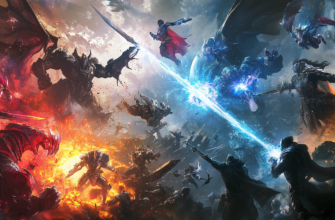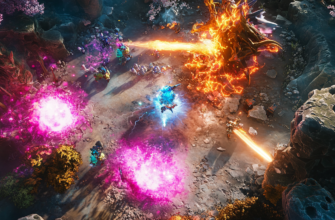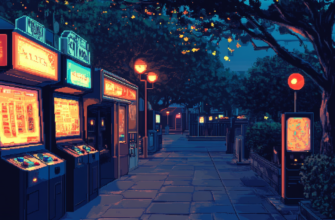- How developers create unique game mechanics
- The process behind innovative game mechanics
- Understanding the foundations of game mechanics
- How developers take basic ideas and inject originality
- 1. Identifying the core loop first
- 2. The power of iteration
- 3. Taking inspiration from different games or even real life
- 4. Algorithmic assistance in generating unique ideas
- Emergent gameplay and how it pushes mechanics further
- Mistakes to avoid when creating game mechanics
- Steps to develop a unique game mechanic
- Practical tips to appreciate game mechanics and improve your understanding
- Conclusion: the impact of unique mechanics on gaming
How developers create unique game mechanics
If you’re like me, you’ve probably marveled at how new games feel unique despite the sheer abundance of titles flooding the market. It’s those key differences in gameplay—those unique game mechanics—that make you fall in love with a title. But have you ever thought about *how* developers create these mechanics? Why do some games just work, while others feel clunky or copy-pasted? I’m about to take you on a journey where we’ll explore exactly what goes into crafting game mechanics that stand out.
The process behind innovative game mechanics
Every legendary game you’ve poured hours into likely started with basic mechanics that evolved into something more. But implementing fresh ideas doesn’t just happen overnight. It involves brainstorming, coding, testing, and a whole lot of fine-tuning.
Let’s break it down. Game developers have a whole toolbox they can rely on when working on new mechanics, but making something stand out requires genuine ingenuity. So how do they go beyond the conventional to make something truly engaging?
Understanding the foundations of game mechanics
Before diving into how developers create something unique, let me explain a bit about game mechanics for those who might be new to the term. Simply put, game mechanics are the rules or methods that define how a game works. It’s the interaction between the player and the game world — the actions you take, and how the game responds.
Game mechanics include everything from basic movement, shooting, trading, to resource collection. Pretty much anything you can interact with in a game can be boiled down into a mechanic of some sort. While the concept seems straightforward, creating a new or unique mechanic can be much more challenging than simply designing something flashy.
How developers take basic ideas and inject originality
Imagine you’re a developer thinking about movement in a platformer. Players could just “jump” like they do in nearly every game out there, but how do you make it special? With some creativity, that jump might transform into a double jump or a wall-cling ability. Think about “Celeste” or “Hollow Knight”; they don’t just let you jump around — they push the mechanic to its limits in unique ways.
This leads developers into a core principle when creating unique systems: take a known mechanic and evolve it. Let’s go through some of their strategies.
1. Identifying the core loop first
Before any innovation happens, one of the first things developers decide is the core gameplay loop.
What’s that? This is the fundamental action players will be repeating over and over again. For example, in first-person shooters, it might be shoot—take cover—reload. In strategy games, it’s usually gather resources—build units—engage in battle.
Once developers lock down the core loop, they begin asking “what if” questions. What if reloading your weapon wasn’t instant? What if taking cover meant physically grabbing objects? You get the idea. By challenging commonly accepted norms, they plant the seed for expanding the game mechanics into new spaces.
2. The power of iteration
This is the bread-and-butter process for most developers when thinking about mechanics: iteration. Rarely does a unique mechanic get born immediately from a whiteboard session and bam, it’s a hit.
Instead, developers create, test, and tweak—over and over. A mechanic might work on paper, but then it fails to feel satisfying in actual gameplay. Remember when “Dead Cells” introduced the roguevania genre by combining permanent death (roguelike) with a Metroidvania structure? That didn’t all just click instantly. Motion Twin, the developers, tried many different variations on both genres before they found that sweet spot between punishing players and giving them progression.
3. Taking inspiration from different games or even real life
Ever noticed how some mechanics in different games feel oddly reminiscent, but still manage to stand out in unique ways? This is a deliberate design choice! Sometimes developers borrow mechanics from other popular titles but layer them with new elements to create something fresh.
An example? Take “The Legend of Zelda: Breath of the Wild.” It borrows mechanics from survival games, like cooking or the breakable weapons feature, but they’re refashioned for a large, open-world adventure. Developers can introduce a new tension into the game this way—yeah, you’ve got this epic sword, but can you risk using it now when it might break?
4. Algorithmic assistance in generating unique ideas
With developments in procedural generation tech, developers use algorithms to help craft dynamic mechanics. Games like “No Man’s Sky” rely on this tech to generate endless environments for players to explore. However, this technology can also be used to modify mechanics—such as dynamically generated combat encounters, puzzles, or even terrain.
Combining AI and procedural systems with player agency can create emergent gameplay too. This allows for outcomes that even the developer couldn’t fully predict, which leads us neatly into our next point.
Emergent gameplay and how it pushes mechanics further
One of the coolest things that can come with well-made mechanics is emergent gameplay. This essentially refers to the unplanned situations or actions that arise from game systems interacting with each other. When multiple mechanics collide in unexpected ways, something unique can happen.
A quick example: In “The Elder Scrolls V: Skyrim,” players were not supposed to be able to fly through the air by stacking cabbages and standing on them—but they did. That’s a whole mechanic coming out of the game’s physics engine! While developers don’t directly create this type of gameplay, they can intentionally design mechanics to have high levels of interaction with each other.
Mistakes to avoid when creating game mechanics
Not every idea is a winner, and developers can fall into traps when creating new mechanics.
- Overcomplicating systems: Simplicity is key! Players need to intuitively understand how a mechanic works before they can master it. Developers often aim for deep gameplay with few inputs. Think about the “Soulsborne” series—complex in execution but relatively simple on the user interface.
- Balancing issues: Creating something unique is awesome, but not when it breaks the balance. A system might seem cool, but if it dominates the game and makes all other options less viable, you’ve got an issue. Think of overpowered gear in some RPGs. Suddenly, nothing else feels worth using.
- Lack of player feedback: As a gamer, we need to feel every action. “Is my attack powerful?” “Did I escape danger in time?” Without strong visual or audio feedback, the mechanic falls flat.
Steps to develop a unique game mechanic
Now that we understand the fundamentals, here’s how game developers systematically develop and refine those groundbreaking mechanics. I’m breaking it into steps, so you can see how much thought and effort goes into even something simple.
- Identify the core theme: Every game typically has a core idea or theme. Is it survival? Heroic fantasy? Developers make sure that the mechanic aligns with that theme.
- Find the mechanic’s purpose: Does the mechanic add depth to the game, or is it just a flashy gimmick? The best mechanics reinforce the game’s goals and aren’t just added for the sake of it.
- Prototyping: Developers create a basic version of the mechanic, often very rough, to see if it’s fun in practice. Spitballing concepts on paper is one thing; how it feels to actually use the mechanic is a totally different matter.
- Iterate and refine: Based on player feedback during playtesting or Alpha builds, developers repeatedly refine the mechanic, tweaking speed, precision, or feedback.
- Test in various contexts: Developers ensure that the mechanic feels good in a variety of game situations, whether it’s combat, puzzle-solving, or navigation.
Practical tips to appreciate game mechanics and improve your understanding
If you’re serious about developing a deep appreciation for game mechanics or understanding them better, here are a few practical tips to follow:
- Play a wide variety of games: Stay curious! The more games you experience, the more you’ll learn to recognize the DNA of game mechanics.
- Analyze “why” something is fun: When you’re enjoying a game, pause and think about what makes it fun. Is it the shooting mechanics? The way the game rewards you for perfect timing?
- Try building your own: Many tools, like Unity or Unreal Engine, have beginner-friendly environments where you can experiment with simple mechanics. Hands-on experience will give you a whole new level of respect for how tricky it is to get mechanics just right.
Conclusion: the impact of unique mechanics on gaming
Creating unique game mechanics is an art form in itself. Developers have to walk a fine line between innovative, fun, and intuitive gameplay experiences. They take a foundational idea and refine it over and over, sometimes testing dozens of concepts before hitting the sweet spot. There’s no overnight formula, but success often means taking inspiration from other sources, iterating constantly, and making sure mechanics mesh well with the overall gameplay.
The next time you pick up a game that feels fresh and exciting, take a moment to appreciate the thought and hard work that went into every jump, every attack, and every interactive feature. And who knows, maybe one day you’ll be the one creating the next groundbreaking game mechanic, too.
Do you have any thoughts on this or experiences with unique game mechanics? Drop a comment below, and let’s start a discussion!

















